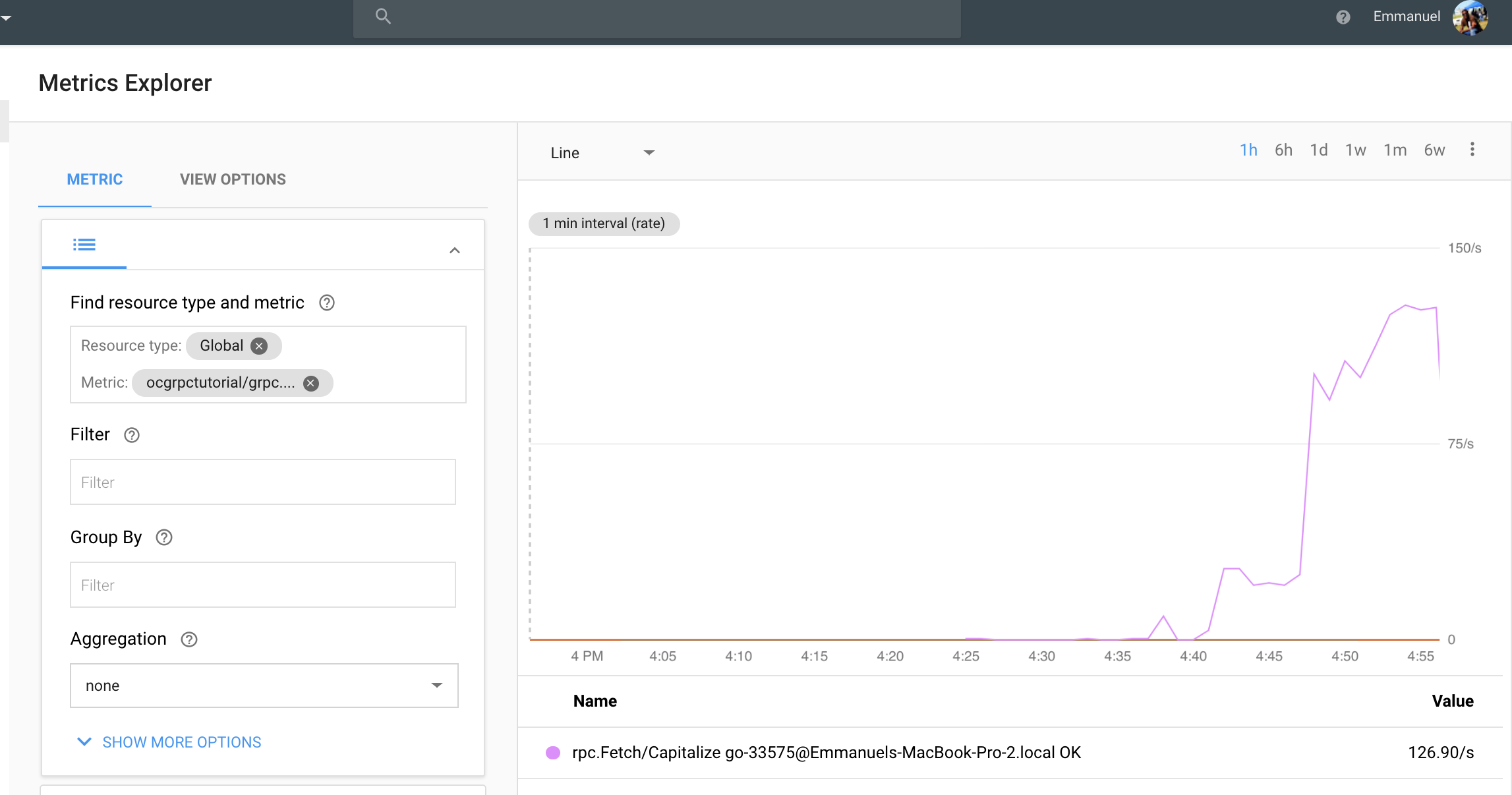Go

- Overview
- Requirements
- Installation
- Creating our gRPC Service
- Instrumentation
- Examining traces
- Examining metrics
Overview
Our service takes in a payload containing bytes and capitalizes them.
Using OpenCensus, we can collect traces and metrics of our system and export them to the backend of our choice, to give observability to our distributed systems.
The grpc-go implementation has already been instrumented with OpenCensus for tracing and metrics.
To enable tracing and monitoring, we’ll import and use the OpenCensus gRPC plugin
Before beginning, if you haven’t already:
- Setup gRPC for Go by visiting this quickstart page https://grpc.io/docs/quickstart/go.html
- Setup Stackdriver Tracing and Monitoring
Requirements
Go for use with gRPC and OpenCensus is best with any version >= 1.8.
Just in case you haven’t installed Go, please visit Installing Go
Installation
Installing gRPC for Go
Please run this command
go get -u google.golang.org/grpcInstalling Protocol Buffers v3
You’ll need to install the protoc compiler to generate gRPC service code.
As per gRPC docs for Go
Please visit https://github.com/google/protobuf/releases for protoc binaries and select the version for your operating system.
Installing the protoc plugin for Go
Please run this command
go get -u github.com/golang/protobuf/protoc-gen-goCreating our gRPC Service
Let’s implement the project, let’s create a directory under our $GOPATH
cd $GOPATH/src && mkdir -p oc.tutorials/ocgrpc && cd oc.tutorials/ocgrpcand for quick reference the working directory that you’ll be using is $GOPATH/src/oc.tutorials.ocgrpc
Import Packages
To enable tracing, we’ll use the following:
| Package | Import path |
|---|---|
| ocgrpc | go.opencensus.io/plugin/ocgrpc |
| trace | go.opencensus.io/trace |
and then to enable metrics, we’ll use the following:
| Handler | Godoc |
|---|---|
| Server handler | go.opencensus.io/plugin/ocgrpc.ServerHandler |
| Client handler | go.opencensus.io/plugin/ocgrpc.ClientHandler |
| Server gRPC metrics/views | https://godoc.org/go.opencensus.io/plugin/ocgrpc#DefaultServerViews |
| Client gRPC metrics/views | https://godoc.org/go.opencensus.io/plugin/ocgrpc#DefaultClientViews |
Protobuf definition
Make a directory called rpc
mkdir -p rpcand inside it paste this protobuf definition
syntax = "proto3";
package rpc;
message Payload {
int32 id = 1;
bytes data = 2;
}
service Fetch {
rpc Capitalize(Payload) returns (Payload) {}
}Generate the service
protoc -I rpc rpc/defs.proto --go_out=plugins=grpc:rpcwhich should now generate the following directory structure
ls -R
rpc
./rpc:
defs.pb.go defs.protoService implementation
In order to use the gRPC service, we need to implement the server.
Create a file called server.go containing this code
package main
import (
"bytes"
"context"
"log"
"net"
"google.golang.org/grpc"
"oc.tutorials/ocgrpc/rpc"
)
type fetchIt int
// Compile time assertion that fetchIt implements FetchServer.
var _ rpc.FetchServer = (*fetchIt)(nil)
func (fi *fetchIt) Capitalize(ctx context.Context, in *rpc.Payload) (*rpc.Payload, error) {
out := &rpc.Payload{
Data: bytes.ToUpper(in.Data),
}
return out, nil
}
func main() {
addr := ":9988"
ln, err := net.Listen("tcp", addr)
if err != nil {
log.Fatalf("gRPC server: failed to listen: %v", err)
}
srv := grpc.NewServer()
rpc.RegisterFetchServer(srv, new(fetchIt))
log.Printf("fetchIt gRPC server serving at %q", addr)
if err := srv.Serve(ln); err != nil {
log.Fatalf("gRPC server: error serving: %v", err)
}
}which you can run by
go run server.goClient implementation
The client talks to the server via a gRPC channel, sending in bytes and getting back the output capitalized.
The contents of client.go are as below:
package main
import (
"bufio"
"context"
"fmt"
"log"
"os"
"google.golang.org/grpc"
"oc.tutorials/ocgrpc/rpc"
)
func main() {
serverAddr := ":9988"
cc, err := grpc.Dial(serverAddr, grpc.WithInsecure())
if err != nil {
log.Fatalf("fetchIt gRPC client failed to dial to server: %v", err)
}
fc := rpc.NewFetchClient(cc)
fIn := bufio.NewReader(os.Stdin)
for {
fmt.Print("> ")
line, _, err := fIn.ReadLine()
if err != nil {
log.Printf("Failed to read a line in: %v", err)
return
}
ctx := context.Background()
out, err := fc.Capitalize(ctx, &rpc.Payload{Data: line})
if err != nil {
log.Printf("fetchIt gRPC client got error from server: %v", err)
continue
}
fmt.Printf("< %s\n\n", out.Data)
}
}and in another terminal, please run
go run client.goand from typing you should be able to get back a response such as
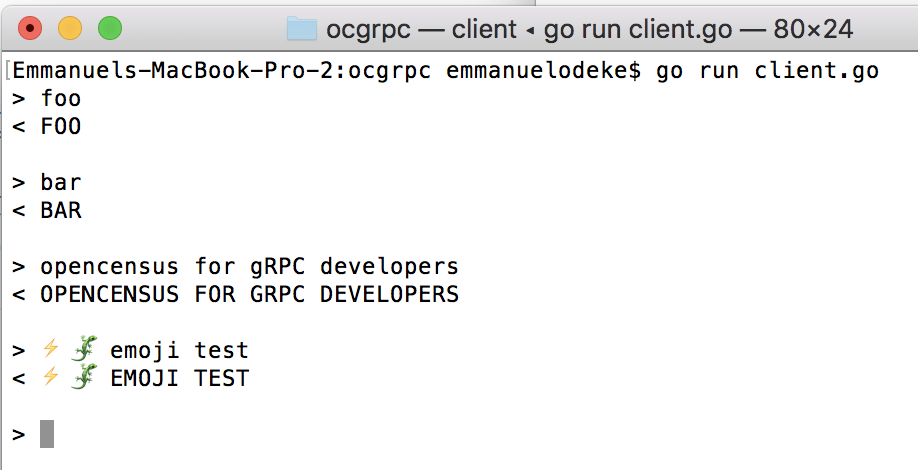
Instrumentation
To gain insights to our service, we’ll add trace and metrics instrumentation as follows
Instrumenting the server
We’ll instrument the server by tracing as well as extracting gRPC metrics using the ServerHandler
which will be registered as a grpc StatsHandler.
import "go.opencensus.io/trace"
func (fi *fetchIt) Capitalize(ctx context.Context, in *rpc.Payload) (*rpc.Payload, error) {
ctx, span := trace.StartSpan(ctx, "oc.tutorials.grpc.Capitalize")
defer span.End()
out := &rpc.Payload{
Data: bytes.ToUpper(in.Data),
}
return out, nil
}
func main () {
srv := grpc.NewServer(grpc.StatsHandler(&ocgrpc.ServerHandler{}))
}import (
"go.opencensus.io/plugin/ocgrpc"
"go.opencensus.io/stats/view"
)
func main() {
if err := view.Register(ocgrpc.DefaultServerViews...); err != nil {
log.Fatalf("Failed to register ocgrpc server views: %v", err)
}
srv := grpc.NewServer(grpc.StatsHandler(&ocgrpc.ServerHandler{}))
}package main
import (
"bytes"
"context"
"log"
"net"
"go.opencensus.io/plugin/ocgrpc"
"go.opencensus.io/stats/view"
"go.opencensus.io/trace"
"google.golang.org/grpc"
"oc.tutorials/ocgrpc/rpc"
// The exporter to extract our metrics and traces
"contrib.go.opencensus.io/exporter/stackdriver"
)
type fetchIt int
// Compile time assertion that fetchIt implements FetchServer.
var _ rpc.FetchServer = (*fetchIt)(nil)
func (fi *fetchIt) Capitalize(ctx context.Context, in *rpc.Payload) (*rpc.Payload, error) {
ctx, span := trace.StartSpan(ctx, "oc.tutorials.grpc.Capitalize")
defer span.End()
out := &rpc.Payload{
Data: bytes.ToUpper(in.Data),
}
return out, nil
}
func main() {
if err := view.Register(ocgrpc.DefaultServerViews...); err != nil {
log.Fatalf("Failed to register ocgrpc server views: %v", err)
}
// Create and register the exporter
sd, err := stackdriver.NewExporter(stackdriver.Options{
ProjectID: "census-demos", // Insert your projectID here
MetricPrefix: "ocgrpctutorial",
})
if err != nil {
log.Fatalf("Failed to create Stackdriver exporter: %v", err)
}
defer sd.Flush()
trace.RegisterExporter(sd)
sd.StartMetricsExporter()
defer sd.StopMetricsExporter()
// For demo purposes let's always sample
trace.ApplyConfig(trace.Config{DefaultSampler: trace.AlwaysSample()})
addr := ":9988"
ln, err := net.Listen("tcp", addr)
if err != nil {
log.Fatalf("gRPC server: failed to listen: %v", err)
}
srv := grpc.NewServer(grpc.StatsHandler(&ocgrpc.ServerHandler{}))
rpc.RegisterFetchServer(srv, new(fetchIt))
log.Printf("fetchIt gRPC server serving at %q", addr)
if err := srv.Serve(ln); err != nil {
log.Fatalf("gRPC server: error serving: %v", err)
}
}Instrumenting the client
We’ll instrument the client by tracing as well as extracting gRPC metrics using the ClientHandler
which will be registered as a grpc StatsHandler.
import "go.opencensus.io/trace"
func main() {
cc, err := grpc.Dial(serverAddr, grpc.WithInsecure(), grpc.WithStatsHandler(new(ocgrpc.ClientHandler)))
ctx, span := trace.StartSpan(context.Background(), "oc.tutorials.grpc.ClientCapitalize")
out, err := fc.Capitalize(ctx, &rpc.Payload{Data: line})
if err != nil {
span.SetStatus(trace.Status{Code: trace.StatusCodeInternal, Message: err.Error()})
log.Printf("fetchIt gRPC client got error from server: %v", err)
} else {
fmt.Printf("< %s\n\n", out.Data)
}
span.End()
}import (
"go.opencensus.io/plugin/ocgrpc"
"go.opencensus.io/stats/view"
"go.opencensus.io/trace"
)
func main() {
if err := view.Register(ocgrpc.DefaultClientViews...); err != nil {
log.Fatalf("Failed to register ocgrpc client views: %v", err)
}
cc, err := grpc.Dial(serverAddr, grpc.WithInsecure(), grpc.WithStatsHandler(new(ocgrpc.ClientHandler)))
}package main
import (
"bufio"
"context"
"fmt"
"log"
"os"
"go.opencensus.io/plugin/ocgrpc"
"go.opencensus.io/stats/view"
"go.opencensus.io/trace"
"google.golang.org/grpc"
"oc.tutorials/ocgrpc/rpc"
// The exporter to extract our metrics and traces
"contrib.go.opencensus.io/exporter/stackdriver"
)
func main() {
if err := view.Register(ocgrpc.DefaultClientViews...); err != nil {
log.Fatalf("Failed to register ocgrpc client views: %v", err)
}
// Create and register the exporter
sd, err := stackdriver.NewExporter(stackdriver.Options{
ProjectID: "census-demos", // Insert your projectID here
MetricPrefix: "ocgrpctutorial",
})
if err != nil {
log.Fatalf("Failed to create Stackdriver exporter: %v", err)
}
defer sd.Flush()
trace.RegisterExporter(sd)
sd.StartMetricsExporter()
defer sd.StopMetricsExporter()
// For demo purposes let's always sample
trace.ApplyConfig(trace.Config{DefaultSampler: trace.AlwaysSample()})
serverAddr := ":9988"
cc, err := grpc.Dial(serverAddr, grpc.WithInsecure(), grpc.WithStatsHandler(new(ocgrpc.ClientHandler)))
if err != nil {
log.Fatalf("fetchIt gRPC client failed to dial to server: %v", err)
}
fc := rpc.NewFetchClient(cc)
fIn := bufio.NewReader(os.Stdin)
for {
fmt.Print("> ")
line, _, err := fIn.ReadLine()
if err != nil {
log.Printf("Failed to read a line in: %v", err)
return
}
ctx, span := trace.StartSpan(context.Background(), "oc.tutorials.grpc.ClientCapitalize")
out, err := fc.Capitalize(ctx, &rpc.Payload{Data: line})
if err != nil {
span.SetStatus(trace.Status{Code: trace.StatusCodeInternal, Message: err.Error()})
log.Printf("fetchIt gRPC client got error from server: %v", err)
} else {
fmt.Printf("< %s\n\n", out.Data)
}
span.End()
}
}Examining traces
Please visit https://console.cloud.google.com/traces/traces
which will give visuals such as:
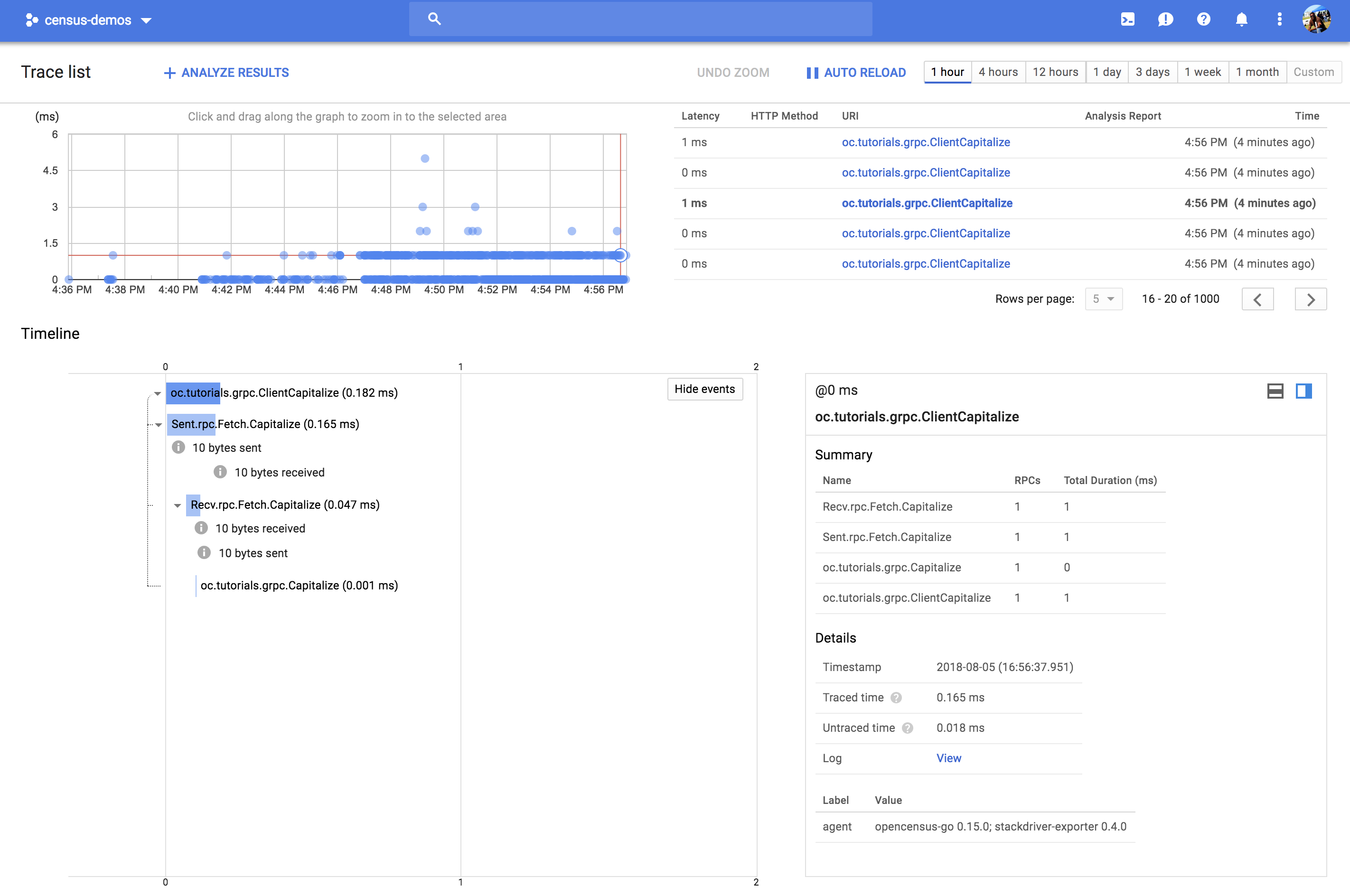
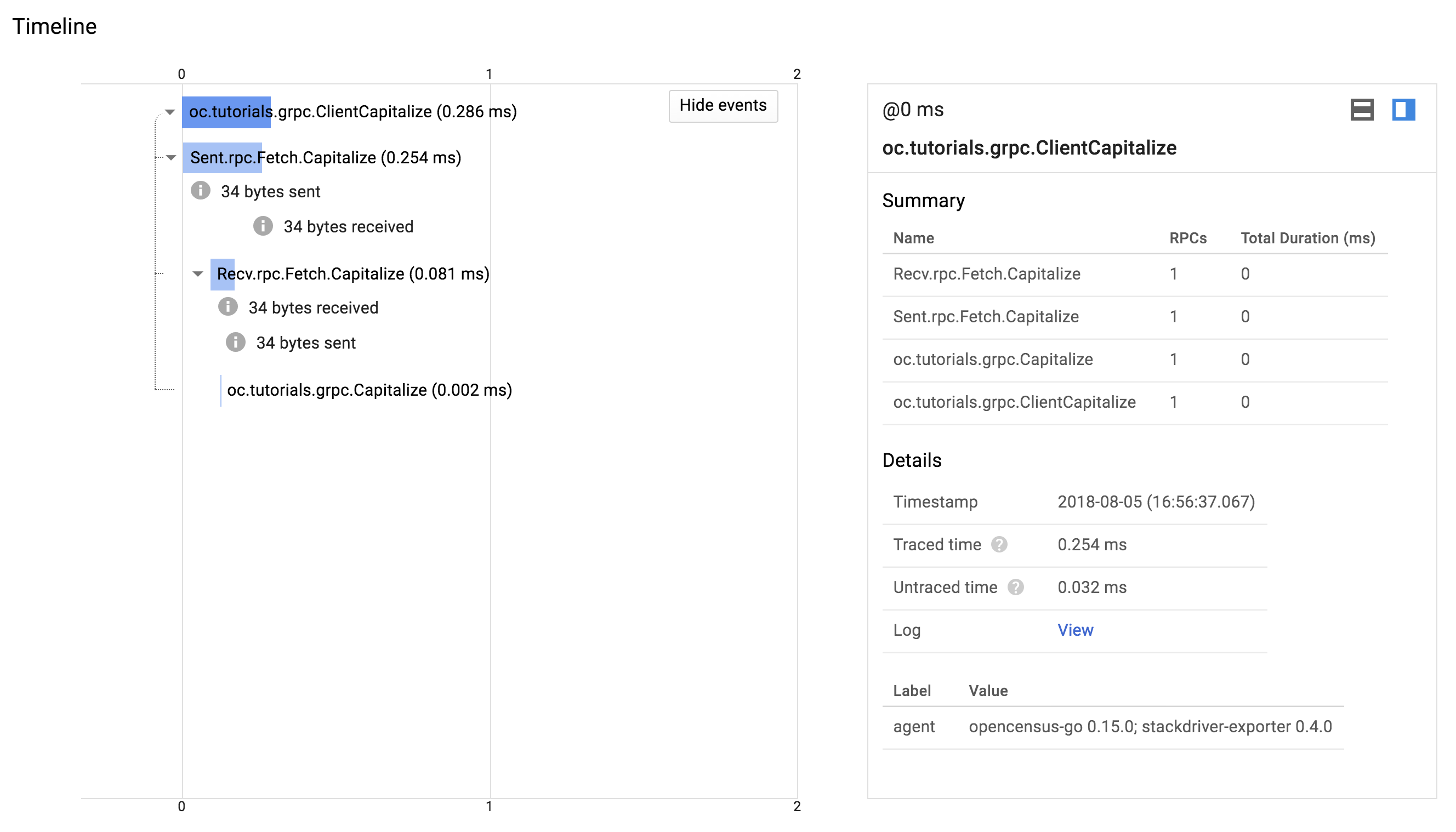
Examining metrics
Please visit https://console.cloud.google.com/monitoring
which will give visuals such as:
Available metrics
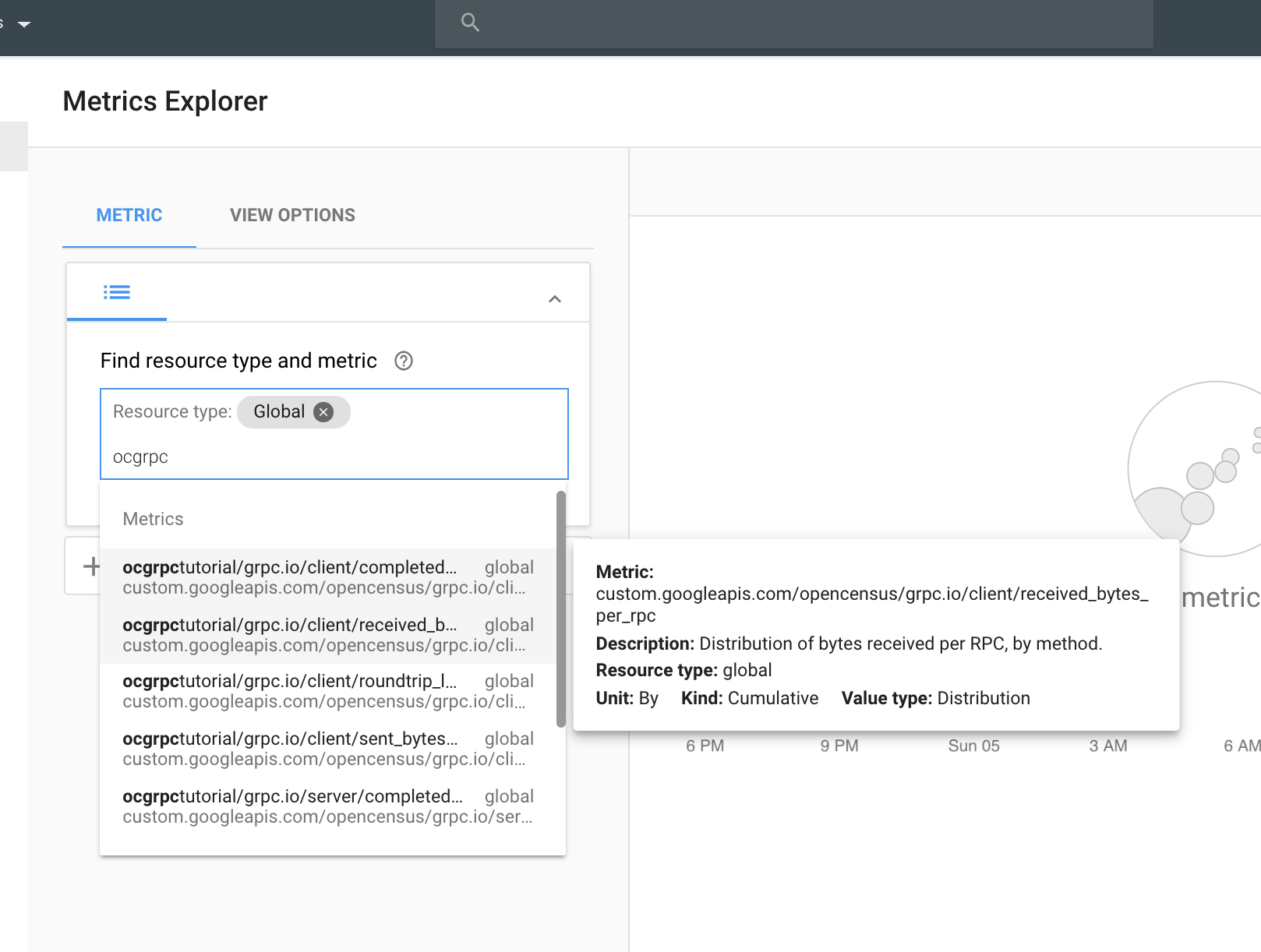
Client latency
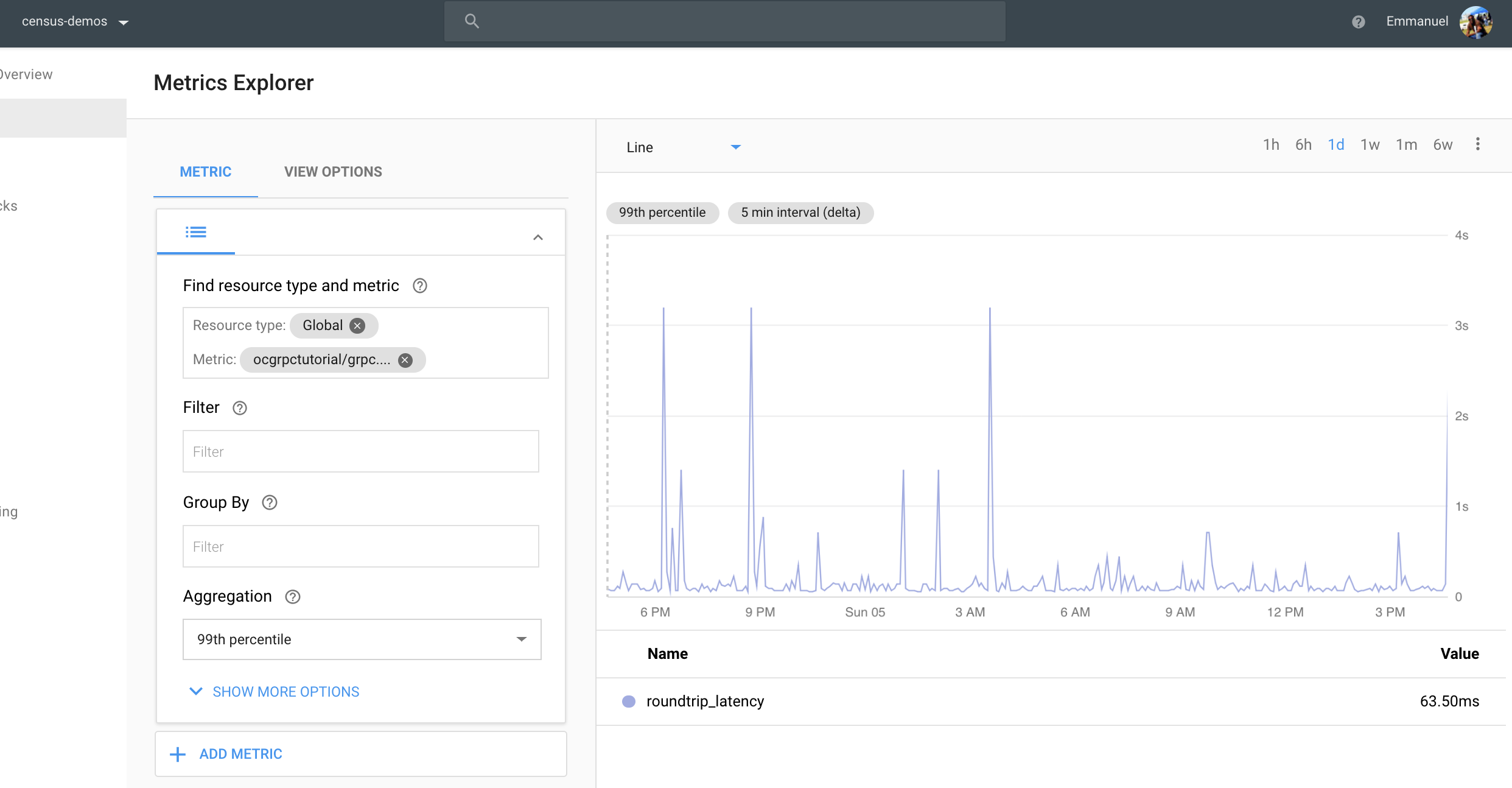
Server completed RPCs
